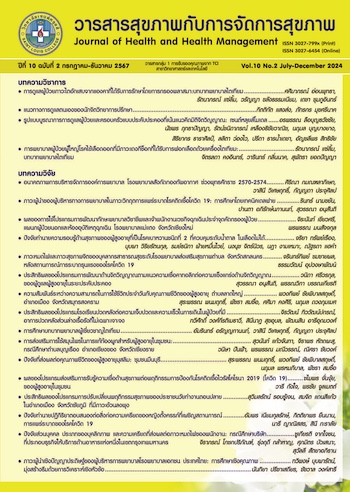Artificial intelligence Leadership (AI-leadership) of Nursing Administrators at Private Hospitals in Thailand: A Qualitative Study at Generated Themes used Thematic Analysis Approach
Keywords:
AI- leadership, nursing administrators, private hospitals, thematic analysisAbstract
This qualitative study armed to study the meaning of AI leadership and the components of AI leadership, the problems and needs of AI capability development. The participants included senior, mid-level, and junior nursing administrators, selected initially through purposive sampling and subsequently expanded through snowball sampling until data saturation was reached with key importance 25 participants across three private hospitals. Data were collected via in-depth, semi-structured interviews, audio-recorded, and transcribed verbatim. Data analysis employed thematic analysis approach and using ATLAS.ti 6.1 to identify major and sub-themes. The study findings: AI- leadership among nursing administrators refers to the ability to use data and AI-powered technologies for effective decision-making, management, and process improvement. Nursing administrators emphasized using data to develop strategies, enhance transparency, foster team collaboration, and improve service quality. They also supported skill development in technology use and fostered a data-driven culture to ensure comprehensive, high-standard patient care. The study identified 21 sub-themes within 6 major themes: 1) Data management, analysis, and decision-making; 2) Innovation and quality improvement; 3) Team collaboration and communication; 4) Quality assessment and monitoring; 5) Strategy development and management; and 6) Partnership in human and organizational development.
References
Bai, Y., Chen, J., & Smith, L. (2020). Implementing AI-driven policies in hospital administration: A case study. Journal of Health Policy, 12(3), 210-219. doi: 10.1016/j.jhp.2020.01.015
Brown, T. (2021). AI in nursing management: Policy and evaluation. Journal of Nursing Leadership, 38(2), 123-135. doi: 10.1016/j.ijnss.2018.09.013
Brynjolfsson, E., & McAfee, A. (2017). Machine, platform, crowd: Harnessing our digital future. New York: Norton & Company.
Chen, X., Zhao, M., & Wang, L. (2023). AI-led transformation in nursing leadership. Nursing Management Journal, 27(1), 45-58. doi: 10.1016/j.nmj.2023.03.004
Davis, S. (2023). Effective implementation of AI in nursing mid-management. International Journal of Nursing Sciences. doi: 10.1097/01.nurse.0000577716.57052.8d
Denzin, N. K. (2009). The research act: A theoretical introduction to sociological methods. New York: Routledge.
Elattar, H., Gupta, A., & Arora, S. (2023). AI applications in healthcare decision-making. Healthcare Review, 45(4), 202-210.
Heckathorn, D. D. (2011). Comment: Snowball versus respondent-driven sampling. Sociological methodology, 41(1), 355-366.
Jones, A. (2019). Nursing leadership and management: Integrating AI for better outcomes. UK: Pearson.
Kirkpatrick, D. L., & Kirkpatrick, J. D. (2006). Evaluating Training Programs: The Four Levels (3rd ed.). San Francisco: Berrett- Koehler.
Koller, D., & Friedman, N. (2009). Probabilistic graphical models: Principles and techniques. Massachusetts: MIT Press.
Miller, R. (2021). AI in clinical nursing: Enhancing management in patient care. Clinical Nursing Review, 42(2), 88-100. Russell, S., & Norvig, P. (2021). Artificial intelligence: A modern approach (4th ed.). UK: Pearson.
Smith, T. (2020). Economic impact of healthcare nursing organizations. Netherlands: Elsevier.
Smith, J. Q., Jones, M. R., & Brown, C. D. (2020). Advancing Managerial Evolution and Resource Management in Contemporary Business Landscapes. Journal of Management Studies, 58, 1-25.
Taylor, J. (2020). The role of nursing heads in AI-integrated healthcare environments. Healthcare Leadership Journal, 9(2), 77-85.
Wang, Q., Li, T., & Zhao, H. (2023). Streamlining documentation in healthcare through AI. Healthcare Informatics, 39(2), 134-145. doi: 10.3928/01484834-20230921-01
White, J. (2022). Roles and AI in nursing management. Journal of Nursing Administration, 52(6), 345-352. doi: 10.3928/01484834-20180921-01
Zhang, Y., Wu, L., & Wei, Z. (2021). The impact of AI-driven decision support in healthcare institutions. Journal of Medical Systems, 45(4), 230-242. doi: 10.1007/s10916-021-01702-4
Downloads
Published
How to Cite
Issue
Section
License
Copyright (c) 2024 Journal of health and health management

This work is licensed under a Creative Commons Attribution-NonCommercial-NoDerivatives 4.0 International License.




